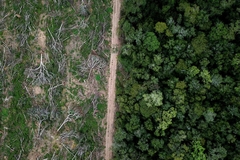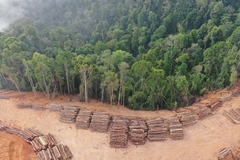FrieslandCampina Profits Hit by Russian Boycott
13 Mar 2015 --- The Russian boycott of western agricultural products hit profits at Dutch dairy cooperative FrieslandCampina last year, leading to a drop in profits of 13.1% on stable global revenue of €11.3bn. As part of its 2014 results announcement this week the company stated that it didn’t believe demand in Russia would recover quickly, “even if the boycott is lifted”. Meanwhile, 2015 looked equally uncertain, according to the company.
FrieslandCampina does however expect to benefit from a weak euro, it said, which would make exports more competitive. It also expected a positive outcome from the growing African and Asian middle classes.
“In 2014 Royal FrieslandCampina’s results were more influenced by external conditions than in other years,” said ceo Cees ‘t Hart. “The year 2014 could accurately be described as ‘dynamic’. Although the disappearance of the EU milk quota will quite possibly lead to even more volatility on the dairy market, the prospects for FrieslandCampina and the member dairy farmers remain positive. The company is well positioned.”

In 2014 revenue rose by 0.6 percent to €11.3 billion as a result of higher sales prices and increased sales of Friso infant nutrition. Currency translation effects had a net negative effect of €176 million on total revenue. The volume in the growth categories dairy-based beverages, branded cheese and ingredients dropped as a result of lower consumption, in part due to higher sales prices in Asia, increased competition in several countries, and the Russian boycott of dairy products.
At a global level the supply of raw milk and the demand for dairy products form a precarious balance. After more than 30 years the milk quota for dairy farmers in the European Union will expire on 1 April 2015. Worldwide the volume of milk supplied over the whole of 2015 is expected to be 2 to 4 percent more than in 2014. It is anticipated that in 2015 the demand for dairy products will increase slightly.
The expectation is that in Asia and Africa it will be mainly the growing middle class that profits from economic recovery. As a result of the lower price level of dairy products it is possible that consumers in emerging markets will also once again be able to afford more dairy products. The relatively cheap euro will mean that dairy products from the euro zone will be better able to compete against other suppliers from countries with different currencies, so more dairy products can be exported. China’s need for dairy products and raw materials is difficult to estimate.
In 2015 FrieslandCampina anticipates volume growth from infant nutrition in Asia and Africa and also expects it will once again be able to achieve volume growth with ingredients and dairy-based beverages. The recovery of the growth of dairy-based beverages will take place primarily outside of Europe. Expenditure on advertising and promotion will increase to support this growth and strengthen the brand positions and market shares. Expenditure for research & development will increase slightly. Investments in infrastructure and production capacity are expected to total around €600 million.
In view of the uncertainties mentioned FrieslandCampina is not making any concrete predictions regarding the expected results for 2015. Taking a longer-term view the outlook remains positive. As the world’s population grows and welfare increases in many regions the demand for food, and in particular food rich in nutrients including dairy products, will continue rising.











